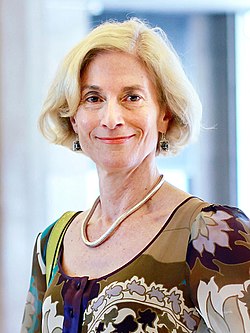
Back مارثا نوسباوم Arabic مارثا نوسباوم ARZ Martha Nussbaum AST Martha Nussbaum Catalan Martha Nussbaumová Czech Martha Nussbaum Danish Martha Nussbaum German Martha Nussbaum Spanish Martha Nussbaum Basque مارتا نوسبوم Persian
Martha Nussbaum | |
|---|---|
 Nussbaum in 2010 | |
| Born | Martha Craven May 6, 1947 New York City, New York, U.S. |
| Spouse | |
| Awards |
|
| Education | |
| Education | New York University (BA) Harvard University (MA, PhD) |
| Doctoral advisor | G. E. L. Owen |
| Philosophical work | |
| School | |
| Institutions | |
| Main interests | |
| Notable works |
|
| Notable ideas | Capability approach |
Martha Nussbaum (/ˈnʊsbɔːm/; née Craven; born May 6, 1947) is an American philosopher and the current Ernst Freund Distinguished Service Professor of Law and Ethics at the University of Chicago, where she is jointly appointed in the law school and the philosophy department.
Nussbaum's work has focused on ancient Greek and Roman philosophy, political philosophy, existentialism, feminism, and ethics, including animal rights. She also holds associate appointments in classics, divinity, and political science, is a member of the Committee on Southern Asian Studies, and a board member of the Human Rights Program. She previously taught at Harvard and Brown.[3][4]
She has written more than two dozen books, including The Fragility of Goodness (1986). She received the 2016 Kyoto Prize in Arts and Philosophy, the 2018 Berggruen Prize, and the 2021 Holberg Prize.[5][6][7] In recent years, she has also been considered a candidate for the Nobel Prize in Literature.[8][9]
- ^ Wendland, Aaron James (December 7, 2018). "Martha Nussbaum: "There's no tension in supporting #MeToo and defending legal sex work"". New Statesman. Archived from the original on December 7, 2018. Retrieved December 7, 2018.
- ^ Heller, Nathan (December 31, 2018). "The Philosopher Redefining Equality". New Yorker. Archived from the original on May 2, 2019. Retrieved June 14, 2019.
- ^ "Martha Nussbaum" Archived October 25, 2019, at the Wayback Machine, University of Chicago, accessed June 5, 2012.
- ^ Aviv, Rachel (July 18, 2016). "The Philosopher of Feelings". The New Yorker. ISSN 0028-792X. Archived from the original on October 13, 2019. Retrieved June 14, 2019.
- ^ "Prof. Martha Nussbaum wins Kyoto Prize". June 17, 2016. Archived from the original on November 19, 2016. Retrieved October 31, 2017.
- ^ Schuessler, Jennifer (October 30, 2018). "Martha Nussbaum Wins $1 Million Berggruen Prize". The New York Times. Archived from the original on October 25, 2019. Retrieved October 30, 2018.
- ^ "Martha C. Nussbaum | Holbergprisen". holbergprisen.no (in Norwegian Bokmål). March 5, 2021. Retrieved March 5, 2021.
- ^ Alex Shepard (October 3, 2022). "Who Will Win the 2022 Nobel Prize in Literature?". The New Republic. Retrieved July 1, 2024.
- ^ Mira Fox (October 2, 2023). "This Jewish philosopher should win the Nobel Prize in Literature". Forward. Retrieved July 1, 2024.